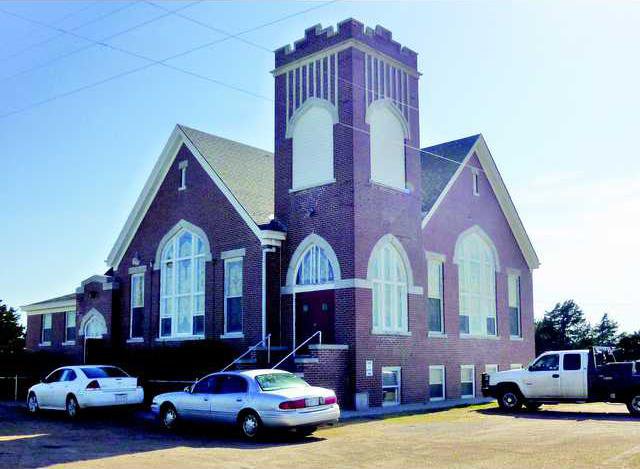PAWNEE ROCK — Bergthal Mennonite Church was built to last forever, or at least until the Lord returned. Settlers had first outgrown a little stone church near Dundee, and then a wooden church northeast of Pawnee Rock. A massive brick building, complete with a bell tower, replaced the wooden building in 1915.
There are no plans to celebrate its centennial, however. The final church service will be held June 30, and sometime after that the church will be torn down.
Lynn Schlosser has served as pastor of Bergthal Mennonite Church since 2002. She said a large memorial celebration service is planned for May 26, starting with worship at 10:30 a.m., and a pot luck lunch after the service. “We’ve invited everyone to come home one more time.”
The congregation has its roots in a colony of Russian Mennonites who arrived in November of 1874, wintering in railroad boxcars near Pawnee Rock. The first child was born in February 1875, and that year the colony was established near Dundee. It was modeled after Russian villages, with the homes close together for protection, and a stone church known as the Bruderhof Church.
A model of the stone church can be found in the basement of the present church, along with a plaque listing names of 21 founding families.
In a few years, the settlers felt safe enough to spread out, and the colony broke up. But the church grew. In 1899, a wood frame church was built northeast of Pawnee Rock. In 1915, that building was replaced by the present church.
Its large sanctuary was usually filled through the 1940s and into the ’50s, with attendance peaking around 260 in 1953. Then, as the rural population began a slow decline, so did the membership, Schlosser said. Today, Sunday attendance is around 14 people. Instead of meeting in the sanctuary, members gather in the smaller “overflow room.”
The decline began to snowball sometime in the last decade. By 2007 Bergthal Mennonite could no longer support a full-time minister. Schlosser, who was full-time pastor with her husband, still serves as the church’s part-time minister.
Two and a half years ago, the discussions began about closing the doors.
“We began to talk in earnest about how to end things, and how to end them well, with respect and honor for our long and rich history and tradition,” Schlosser said. Members decided to raze the building after the final service.
“Once you sell it you lose control of what happens to it,” she said. “It would be very hurtful for members to see it fall in on itself. We’ve all seen empty churches fall apart in the country. We thought this church deserved better than that.”
The building can’t be moved and would be costly to maintain, Schlosser said. The roof has leaked for years, and there is water damage and mold.
But it is also filled with stained glass windows that members do plan to save, if possible, along with much of the woodwork and a few memorial bricks.
There are plans to erect a monument of some kind at the cemetery near the church.
This week, Larry Hixon and Steve Hetzke looked at removing the 1915 cornerstone. Both men said their wives grew up attending Bergthal Mennonite Church. Ronda and Larry Hixon were married there; her ancestors were among the early colonists. The great-grandfather of Jolene Hetzke was the first baby born at the settlement.
Ronda Hixon said the small congregation still shows a lot of life, with baptisms, child dedications, weddings and funerals, and many pot lucks. With support from the church, members Don and Marie Gaeddert left to become missionaries in China. Members also put together 1,000 school kits, sent to children around the world, and sent 18 quilt tops to the Mennonite Central Committee Relief Organization.
“We’re still an active church,” she said. “But there’s not enough of us to keep it going.”
Steve Hetzke said the church is also part of the rural community. It’s a landmark that people use for giving directions. Although it’s located at SW 110 Ave. and SW 30 Road, most people would say it’s on Mennonite Church Road, the blacktop on the east edge of Pawnee Rock.
Closing churches due to declining memberships has been a trend in mainline Protestant churches across the nation, Schlosser said, “though rural churches seem to be on the frontline, due, in large part, to rural depopulation.”
“In some ways it was almost inevitable that we would end up chiseling out the cornerstone,” Hixon said. He wonders if the early settlers would have been disappointed.
Perhaps not. Just as those settlers realized they could safely spread out from the village to the country, their descendants have spread across the nation and world. Many have promised to return for the memorial this month, Schlosser said.
“It’s been a privilege to be part of the tradition these few years,” she said. “We continue to grieve the loss of what once was, but we carry on with faith that God has guided our way.”
Landmark Bergthal Mennonite Church closing its doors





